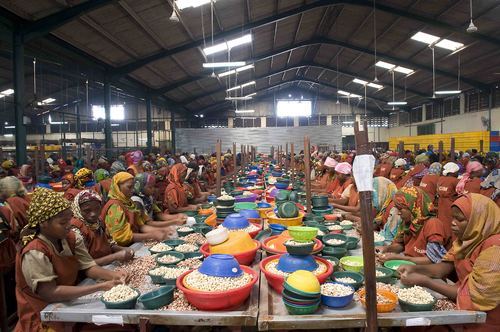Ghana’s quest to industrialize its economy, despite on track, has been challenged by the inadequate raw materials to feed some of the factories. Without raw materials, manufacturing companies cannot produce any substantial goods to feed the growing population of Ghana, not to talk of exporting.
Due to lack of raw materials, some of the factories in the country have either been forced to operate at low capacity or shut down completely. Currently, the Mim Cashew and Agricultural Production Limited in the Ahafo Region has been shut down due to lack of raw materials, cashew nuts to keep the factory operational. Such occurrences are unfortunate because the economic impacts on livelihoods of people in the catchment areas are huge.
More than 1,000 employees been laid off
The closure of the Mim Cashew and Agricultural Production Limited, according to Mrs. Jemima Akusika Hansen, the Director of Human Resource and Administration, resulted in more than 1,000 employees being laid off. This has further worsened the plights of people who are already bearing the brunt of the economic impacts of the pandemic.
Meanwhile, Mrs. Hansen explained that the free-zone enterprise was shut down in November 2020 due to a number of challenges that hinder its smooth operations. According to her, the factory was shut down due to the high cost of production, processing and lack of raw materials to feed the factory.
Furthermore, Mrs. Hansen stated that cashew production and processing was labour intensive. This means that most of the activities of the company were carried out with the human hand. As a result, she appealed to the government to help revive the company to create jobs for the local people.

Nevertheless, Mrs. Hansen revealed that the company is currently focusing on farming, saying it had 50 acres of sugarcane and 750 acres of cashew plantations. But yet again, she noted that it would require modern, state-of-the-art machines and equipment to revive the factory.
Minister’s response
She laid these concerns before Dr. Owusu Afriyie Akoto, the Minister of Food and Agriculture (MoFA), who with some some key staff of the Ministry, is on a three-day working visit to the Ahafo, Bono and Bono East Regions.
Meanwhile, in response, Dr. Akoto expressed shock about the collapse of the company and, therefore, pledged the government’s readiness and support to assist in resuscitating it. According to Dr. Akoto, government is working to regulate the cashew industry and promises to support the company to import machines and equipment from Vietnam to revive operations.
Withdrawal of policy banning export of raw cashew
It can be recalled that in 2016, President John Dramani Mahama withdrew the policy banning the export of raw cashew which was introduced by the Ministry of Trade and Industry as part of measures to boost the local processing of cashew and subsequently create jobs for the people.
The then Presidents was forced to withdraw the policy after cashew farmers in the Brong Ahafo Region and buyers voiced their concerns over the policy, which they said was counter-productive. The government then pledged to establish a Cashew Marketing Board to regulate the cashew industry.
Trade in raw materials in Africa, and in Ghana particularly, has not yielded the needed results so far. The industrialize revolution which is key for Ghana can only be sustained when there is enough supply of raw materials to feed our factories.
Recently, Local fruit juice manufacturing firm, Ekumfi Juice, was forced to reduce its production capacity as a result of the long period of drought which affected the production of pineapple, its major raw material. This means that for Ghana to make the most out of the industrialization agenda, it needs to lay more emphasis on the production of raw materials to feed these infant industries.
READ ALSO: Cocoa accounts for 50% of Ghana’s exports to the EU



















